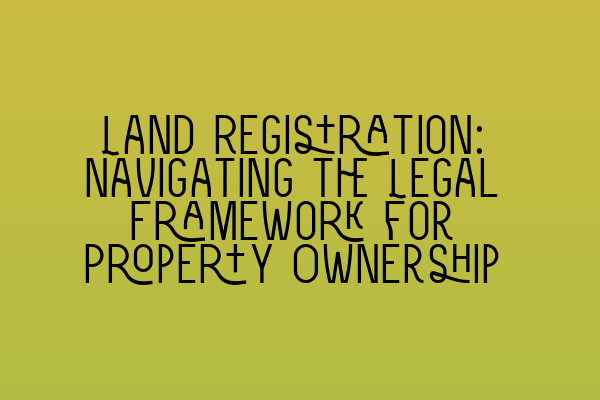Land Registration: Navigating the Legal Framework for Property Ownership
Welcome to SQE Property Law & Land Law, your trusted solicitors in property and land matters. In this blog post, we will be delving into the complex world of land registration and guiding you through the legal framework for property ownership.
Land registration plays a crucial role in ensuring the security and integrity of property rights. When you purchase a property, it is essential to have a clear understanding of the land registration process, as it directly affects your ownership rights and responsibilities. Let’s dive in!
Understanding Land Registration
Land registration is the official process of recording the ownership and interests in land. It provides a transparent and reliable system for establishing and protecting property rights. In the United Kingdom, the primary legislation governing land registration is the Land Registration Act 2002.
Under the land registration system, property owners are required to register their land with the Land Registry. This registration ensures that the ownership details are recorded, and any legal interests or encumbrances can be easily identified by potential buyers or lenders.
Land registration offers several advantages, including:
- Protection of legal ownership
- Facilitation of property transactions
- Providing certainty in property ownership
- Prevention of fraud
Key Principles of Land Registration
Now that we have a general understanding of land registration, let’s explore some key principles that make up the legal framework:
1. Mirror Principle
The Mirror Principle states that the land register should accurately reflect the current state of ownership and interests in the property. It means that the registered owner’s details should be an accurate mirror of the legal owner.
2. Curtain Principle
The Curtain Principle means that the land register is conclusive evidence of ownership and rights concerning the property. This principle provides certainty to buyers and lenders, who can rely on the information in the register without having to investigate historical transactions.
3. Insurance Principle
The Insurance Principle is a significant feature of the land registration system in the UK. The Land Registry provides indemnity for loss resulting from errors or omissions in the register. This insurance protects buyers and lenders against fraudulent or defective registrations.
The Land Registration Process
Registering land can be a complex process, involving various steps and requirements. Here are the key stages:
1. Application for Registration
The landowner or their solicitor must submit an application for registration to the Land Registry. The application must provide details about the property, including its boundaries, any existing rights or interests, and evidence of the owner’s title.
If the property is unregistered, the landowner must apply for first registration. This involves providing evidence of ownership and establishing the boundaries of the land.
2. Examination and Processing
Once the application is received, the Land Registry will examine the documents and conduct necessary searches to verify the information provided. They will check for any potential issues that could affect the registration, such as conflicting interests or disputes.
If there are no objections or concerns, the Land Registry will proceed with processing the application and updating the register accordingly.
3. Issue of Title Certificate
After the registration is complete, the Land Registry will issue a title certificate to the registered owner. This certificate serves as official proof of ownership and can be used for future property transactions or financing.
Importance of Professional Legal Assistance
Given the complexity of land registration and the legal framework surrounding it, seeking professional legal assistance is highly recommended. Solicitors specializing in property law can help guide you through the process, ensure all necessary documentation is in order, and address any concerns or challenges that may arise.
At SQE Property Law & Land Law, our team of experienced solicitors is here to assist you with all your land registration needs. We can provide expert advice, handle the necessary paperwork, and ensure a smooth and efficient registration process.
Conclusion
Land registration is a vital aspect of property ownership in the UK. Understanding the legal framework and following the proper registration process is essential for securing your property rights and avoiding potential pitfalls.
If you are in need of professional assistance with land registration or any other property law matters, don’t hesitate to reach out to SQE Property Law & Land Law. We are here to serve you and provide the highest level of expertise and support.
Related Articles:
